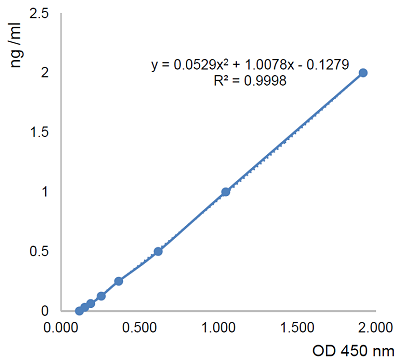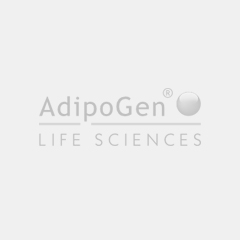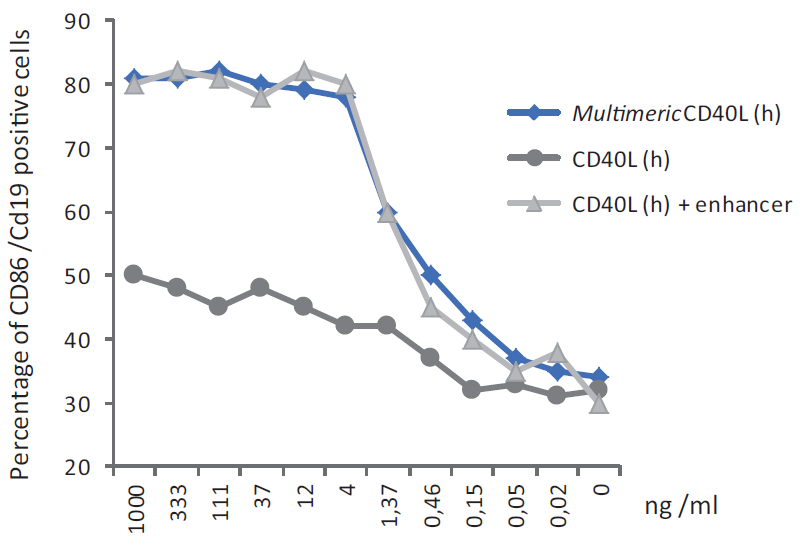
Standard Curve
CD40L (human) ELISA Kit
AG-45B-0018
ReactivityHuman
Product group Assays
Overview
- SupplierAdipoGen Life Sciences
- Product NameCD40L (human) ELISA Kit
- Delivery Days Customer10
- ApplicationsELISA
- Assay Detection Range0.03125 to 2ng/ml
- Assay Sensitivity20pg/ml
- CertificationResearch Use Only
- Protein IDP29965
- Protein NameCD40 ligand
- Scientific DescriptionCD40 (also called, Tumor necrosis factor receptor superfamily member 5 or TNFRSF5), a transmembrane type I glycoprotein, belongs to the tumor necrosis factor (TNF) gene superfamily and behaves as a co-stimulatory molecule found on B cells, monocytes, antigen presenting cells, endothelial, smooth muscle cells, fibroblasts and platelets. Its ligand, CD40L (also called CD154), a type II transmembrane protein, is a 261 amino acid (aa) glycoprotein that forms homotrimers. CD40L is found on activated T cells, B cells, platelets, endothelial, epithelial and smooth muscle cells. Proteolytic cleavage can produce a soluble form of CD40L (sCD40L). Platelets are the main source of sCD40L. CD40-CD40L interaction is an essential signal for B cell proliferation, expression of activation markers, immunoglobulin production and isotype switching, formation of B memory cells and germinal centers. It also prevents apoptosis of germinal center B cells. Defective expression of CD40L in humans leads to an inability to produce isotypes other than IgM (hyper IgM syndrome) and to an absence of germinal centers. In dendritic cells, CD40 ligation induces more effective antigen, enhances T-cell stimulatory capacity and induces production of several inflammatory cytokines and chemokines. CD40-CD40L interactions are crucially involved in development of autoimmune disease and have also impact on growth regulation of certain carcinomas. Elevated levels of sCD40L have been observed in sera from patients with systemic lupus erythematosus (SLE), chronic lymphocytic leukemia (CLL) and unstable angina. - ELISA Assay. Detects soluble human CD40L in serum, plasma and cell culture supernatant. Colorimetric sandwich assay. Sample types: Cell Culture Supernatant, Plasma, Serum. Range: 0.015625 to 1ng/ml. Sensitivity: 10pg/ml. CD40 (also called, Tumor necrosis factor receptor superfamily member 5 or TNFRSF5), a transmembrane type I glycoprotein, belongs to the tumor necrosis factor (TNF) gene superfamily and behaves as a co-stimulatory molecule found on B cells, monocytes, antigen presenting cells, endothelial, smooth muscle cells, fibroblasts and platelets. Its ligand, CD40L (also called CD154), a type II transmembrane protein, is a 261 amino acid (aa) glycoprotein that forms homotrimers. CD40L is found on activated T cells, B cells, platelets, endothelial, epithelial and smooth muscle cells. Proteolytic cleavage can produce a soluble form of CD40L (sCD40L). Platelets are the main source of sCD40L. CD40-CD40L interaction is an essential signal for B cell proliferation, expression of activation markers, immunoglobulin production and isotype switching, formation of B memory cells and germinal centers. It also prevents apoptosis of germinal center B cells. Defective expression of CD40L in humans leads to an inability to produce isotypes other than IgM (hyper IgM syndrome) and to an absence of germinal centers. In dendritic cells, CD40 ligation induces more effective antigen, enhances T-cell stimulatory capacity and induces production of several inflammatory cytokines and chemokines. CD40-CD40L interactions are crucially involved in development of autoimmune disease and have also impact on growth regulation of certain carcinomas. Elevated levels of sCD40L have been observed in sera from patients with systemic lupus erythematosus (SLE), chronic lymphocytic leukemia (CLL) and unstable angina.
- ReactivityHuman
- Storage Instruction2°C to 8°C
- UNSPSC41116100
- SpeciesHuman



